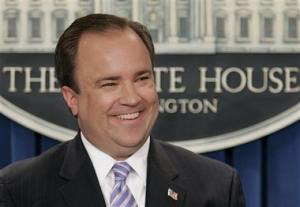 |
 |
 |
 Travel Writers' Resources | November 2007 Travel Writers' Resources | November 2007  
Royalties Trump Loyalties
 Matt Apuzzo - Associated Press Matt Apuzzo - Associated Press
go to original


| | Scott McClellan: Kissing and telling (AP) |
White House press secretaries, who speak for the president and appear before the nation on his behalf, have traditionally kept their secrets while their bosses are in office.

That unwritten rule has faded in the face of big advances for political tell-all books.

Scott McClellan, who served as White House press secretary for nearly three years of the Bush administration, surprised his former colleagues last week when his publisher released three teaser paragraphs from his upcoming book. The excerpt seemed to blame President Bush for McClellan's false statements during the early days of the CIA leak scandal.

"The old rules and old standards of what was considered proper and what was not are less and less abided by," said Jody Powell, who served as President Carter's press secretary. "That's true in all walks of life."

Plenty of press secretaries have written behind-the-scenes views of the West Wing. But such glimpses have traditionally been available only after the president has left office. George Christian, for instance, published "The President Steps Down," about the end of President Johnson's administration, a year after LBJ left the White House.

Others waited even longer. President Kennedy's press secretary, Pierre Salinger, wrote several books about the administration but only after the president's death. The diaries of James Hagerty, President Eisenhower's press secretary, were published after Hagerty died in 1981, a dozen years after Ike's death.

Once the president is out of office, the stories belong to history, said Marlin Fitzwater, who served as White House press secretary under Presidents Reagan and Bush and published his memoir in 1995 .

"In this day and age, there are so many books, the public hardly blinks an eye on the question of loyalty," Fitzwater said.

Veteran political consultant Tobe Berkovitz, the dean of Boston College's communication school, said loyalty has faded as the image of the White House press secretary has changed. Once merely a mouthpiece for the president, press secretaries have become political stars in their own right.

Fitzwater dates the trend to 1988, when his predecessor in the Reagan administration, Larry Speakes, published "Speaking Out." The memoir described the president as aloof, cast Vice President George H. W. Bush as a "yes man," and generally created ill will in Washington.

"I have no affection for these kiss-and-tell books," Reagan said at the time.

Speakes ultimately apologized, saying he regretted providing fodder for Reagan's enemies.

During the Clinton administration, political consultant Dick Morris wrote a memoir about the president's re-election campaign. Morris wasn't a press secretary, but White House communications director George Stephanopoulos still wasn't pleased.

"You have a responsibility not to embarrass the president," said Stephanopoulos, who often conducted the daily press briefings and acted as an official spokesman.

Yet Stephanopoulos fetched a $2.7 million advance for his 1999 memoir "All Too Human." In it, Stephanopoulos said he "felt like a dupe" for defending Clinton's character and painted an often unflattering portrait of the president.

"I think he's probably more comfortable being part of the professional critics of the Washington establishment," Clinton later said of his former aide.

More recently, George W. Bush's first press secretary, Ari Fleischer, published "Taking Heat." Unlike Stephanopoulos or Speakes, however, Fleischer described Bush in favorable terms and saved his harshest words for the media.

"I could have made a lot more money if I'd decided to write about clashes, or criticize the president, or even criticize the press more," Fleischer said after the book's release. "But I chose not to."

Whether McClellan's book, "What Happened," will follow his predecessor's lead or take a more incisive tone remains unclear. The book isn't even finished. The teaser quotes were released five months in advance.

Powell, Carter's press secretary, said he probably would read the book.

"I always had a great deal of sympathy for Scott," Powell said. "I felt like they gave the guy a broomstick and sent him out to hit major league pitching."

After the excerpt caused buzz on Capitol Hill, McClellan's editor offered a clarification suggesting the former press secretary wasn't modeling himself after Speakes or Stephanopoulos. PublicAffairs Books editor Peter Osnos said McClellan didn't think Bush deceived anyone. Rather, Osnos said, Bush himself was misled by White House aides.

"He's not suggesting the president himself had lied," Osnos said, adding, "Scott's not a guy who's pursuing any sort of agenda or being vindictive." | 
 | |
 |



